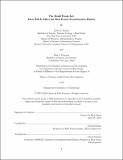| dc.contributor.advisor | David Geltner. | en_US |
| dc.contributor.author | Frazier, Kelly G. (Kelly Gene) | en_US |
| dc.contributor.author | Grayson, Paul C | en_US |
| dc.contributor.other | Massachusetts Institute of Technology. Center for Real Estate. Program in Real Estate Development. | en_US |
| dc.date.accessioned | 2013-02-15T14:42:06Z | |
| dc.date.available | 2013-02-15T14:42:06Z | |
| dc.date.copyright | 2012 | en_US |
| dc.date.issued | 2012 | en_US |
| dc.identifier.uri | http://hdl.handle.net/1721.1/77131 | |
| dc.description | Thesis (S.M. in Real Estate Development)--Massachusetts Institute of Technology, Program in Real Estate Development in Conjunction with the Center for Real Estate, 2012. | en_US |
| dc.description | Mr. Grayson received his S.M. in Real Estate Development, Sept. 2012.We will continue to monitor Mr. Kelly’s status and remove the note if/when he receives his degree. Page 126 blank. Cataloged from department-submitted PDF version of thesis. This electronic version was submitted and approved by the author's academic department as part of an electronic thesis pilot project. The certified thesis is available in the Institute Archives and Special Collections. | en_US |
| dc.description | Includes bibliographical references (p. 108-111). | en_US |
| dc.description.abstract | This thesis investigates one of the United States' most sweeping regulatory responses since the New Deal legislation passed in the 1930's, the Dodd Frank Act. While the Dodd Frank Act will affect numerous financial markets, this thesis will focus on the implications of this regulation on the real estate securitization market. To better understand the regulatory response towards real estate securitization, we will clarify some of the key definitions, explain the history of securitization and describe the fundamental issues that led to the real estate securitization boom and subsequent bust as well as its implications on the financial crisis in the late 2000s. We will then summarize in detail the key provisions in the Dodd Frank Act associated with real estate securitization and describe the framework for which these provisions were formed. In conclusion, we will examine the implications of these provisions and explain our position of how the Dodd Frank Act will not achieve its desired effect on the real estate securitization market as drafted. | en_US |
| dc.description.statementofresponsibility | by Kelly G. Frazier and Paul C. Grayson. | en_US |
| dc.format.extent | 126 p. | en_US |
| dc.language.iso | eng | en_US |
| dc.publisher | Massachusetts Institute of Technology | en_US |
| dc.rights | M.I.T. theses are protected by
copyright. They may be viewed from this source for any purpose, but
reproduction or distribution in any format is prohibited without written
permission. See provided URL for inquiries about permission. | en_US |
| dc.rights.uri | http://dspace.mit.edu/handle/1721.1/7582 | en_US |
| dc.subject | Center for Real Estate. Program in Real Estate Development. | en_US |
| dc.title | The Dodd Frank Act : how will it affect the real estate securitization market | en_US |
| dc.title.alternative | Dodd-Frank Wall Street Reform and Consumer Protection Act : how will it affect the real estate securitization market | en_US |
| dc.type | Thesis | en_US |
| dc.description.degree | S.M.in Real Estate Development | en_US |
| dc.contributor.department | Massachusetts Institute of Technology. Center for Real Estate. Program in Real Estate Development. | en_US |
| dc.contributor.department | Massachusetts Institute of Technology. Center for Real Estate | |
| dc.identifier.oclc | 825121820 | en_US |
